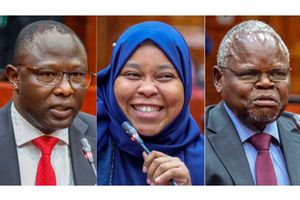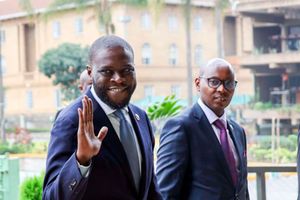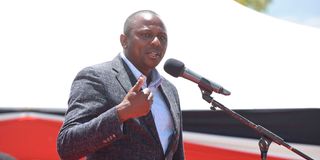
National Assembly Majority Leader Kimani Ichungwah.
A call by Opposition leaders for a nationwide boycott of businesses linked to the Kenya Kwanza regime has drawn sharp criticism from allies of President William Ruto, who have labelled the move as reckless and economically harmful.
The Opposition, now branding itself as the United Opposition, includes former deputy president Rigathi Gachagua’s Democracy for the Citizens party (DCP), Kalonzo Musyoka’s Wiper, People’s Liberation Party (PLP) led by Martha Karua, Eugene Wamalwa’s Democratic Action Party (DAP-K), Democratic Party (DP) under Justin Muturi and former president Uhuru Kenyatta’s Jubilee, represented by national Chairman Torome Saitoti as well as former Interior Cabinet Secretary Fred Matiang’i.
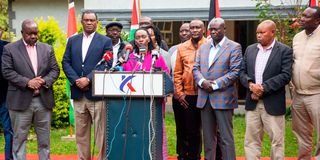
People’s Liberation Party leader Martha Karua (centre) addresses journalists flanked by (from left) Dr Fred Matiangi, former Attorney-General Justin Muturi, former Deputy President Rigathi Gachagua and other opposition leaders at SKM Command Center in Nairobi on July 8, 2025.
The leaders on Tuesday jointly announced a boycott of all institutions, services, and businesses affiliated with President Ruto’s administration, accusing it of presiding over ethnic persecution, extrajudicial killings, and state-sponsored militia violence.
However, the move triggered immediate backlash from ruling party figures and political analysts, who dismissed it as economically destructive and politically regressive.
“This is economic sabotage,” said National Assembly Majority Leader Kimani Ichung’wah, condemning the opposition’s call for a boycott.
“This is the same economic sabotage Kenyans have witnessed with sponsored goons terrorising traders through looting and torching of businesses,” he told Nation.
“The pattern is clear, and the sponsors are now speaking out—as you’ve seen, their allies are being apprehended while mobilizing the goons. Probably realising the noose is tightening around those they’ve been using, they now imagine that changing strategy will distract investigators.”
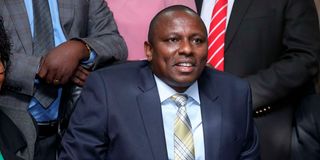
National Assembly Majority Leader Kimani Ichung’wah. Mr Ichung’wah dismissed the opposition’s claims on the VAT increase, saying the government has cushioned Kenyans through the reduction of the Import Declaration Fee from 3.5 per cent to 2.5 per cent of the customs value of imported goods and Railway Development Levy from 2.5 per cent to 1.5 per cent.
Mr Ichung’wah, the Kikuyu MP, further warned that the boycott could harm ordinary Kenyans more than the politicians it targets.
His Senate counterpart, Majority Leader Aaron Cheruiyot, dismissed the opposition leaders as political relics who have lost relevance.
“Those are two paper tigers who overate their place in Kenya’s political space,” he said, referring to Mr Gachagua and Mr Musyoka
“They represent outdated tribal politics that resonates with only a small segment of the country. Ironically, the companies they want boycotted will likely see record profits as a sign of public disapproval of their message.”
Political analyst Javas Bigambo was equally critical arguing that the opposition’s strategy lacks ideological coherence and genuine reformist vision.
“They are trying to sharpen their political edges to galvanise the country around their politics,” Mr Bigambo said. “Sadly, their galvanisation isn’t rooted in any progressive fundamentalism, but in riding the wave of Gen Z rubble-rousing political activism.”
He described the boycott campaign as a recycled script that failed in the past and unlikely to yield meaningful change today.
“It can be construed as a union of vengeance by former deputies from different regimes. The absence of a progressive and holistic worldview in the Gachagua-led opposition points to a movement that is not offering alternative leadership or governance solutions. That’s why this boycott has a near-impossible chance of success.”
Mr Bigambo also questioned the moral standing of the opposition to call for more economic disruption.
“Given the economic injustices already inflicted on traders due to past protests, the opposition cannot in good conscience call for further paralysis while claiming to act out of patriotism,” he added.
The opposition, however, insists the boycott is a response to what it calls state brutality and oppression.
They claim that regime-linked businesses and institutions are complicit in shielding or financing repression, and must be held accountable through economic pressure and civic action.
The campaign comes in the wake of violent Saba protests marked by clashes between demonstrators and police, and what the opposition says was targeted violence in Mt Kenya, Nairobi and other parts of the country.
They cite cases of looted clinics, disrupted medical operations, and extrajudicial killings that they claim meet the threshold for crimes against humanity under the Rome Statute.
As the political temperatures rise, the effectiveness of the boycott remains to be seen.
The opposition leaders have since listed three action points for the public including boycott of all businesses, services, and institutions owned, operated, or publicly associated with the Kenya Kwanza regime and its enablers.
“A list of shame is set to be published and crowdsourced, allowing citizens to contribute information on regime-affiliated enterprises," they said through former Trade Minister Dr Mukhisa Kituyi who read the statement on their behalf.
They also urged Kenyans to refuse to legitimise or participate in events, platforms, or forums organised by individuals or organisations that justify or ignore state violence.
“We cannot continue like it is business as usual,” the statement said. “Too much blood has been spilled with zero accountability.”
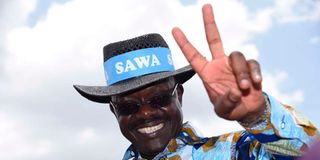
Presidential hopeful Dr Mukhisa Kituyi at Misikhu trading centre in Bungoma County on his way to Mbakalo in the county during his homecoming on March 6, 2021.
They called for the support for grassroots resistance, civil disobedience, and citizen-led initiatives.
“Change does not come by asking nicely,” said Dr Kituyi. “It is wrestled from the hands of those who thrive on fear and oppression.”
He went on: “This regime is hostile. It cannot be reasoned with. It must be resisted. We will not rest. We will not retreat. We will not surrender. Until every drop of innocent blood is accounted for."
President Ruto has however, dismissed the opposition’s resistance calls, warning that he will not allow any individual to incite Kenyans to violence and other illegal actions.
“They have said that they will no longer wait for 2027 for us to vote. That they want to plan violence and overthrow the government of Kenya before 2027, I daring them to try.”
“Let them try, this is a democratic nation. You cannot tell us that you want to plan violence to overthrow the government of Kenya. Try it and see for yourselves.”

